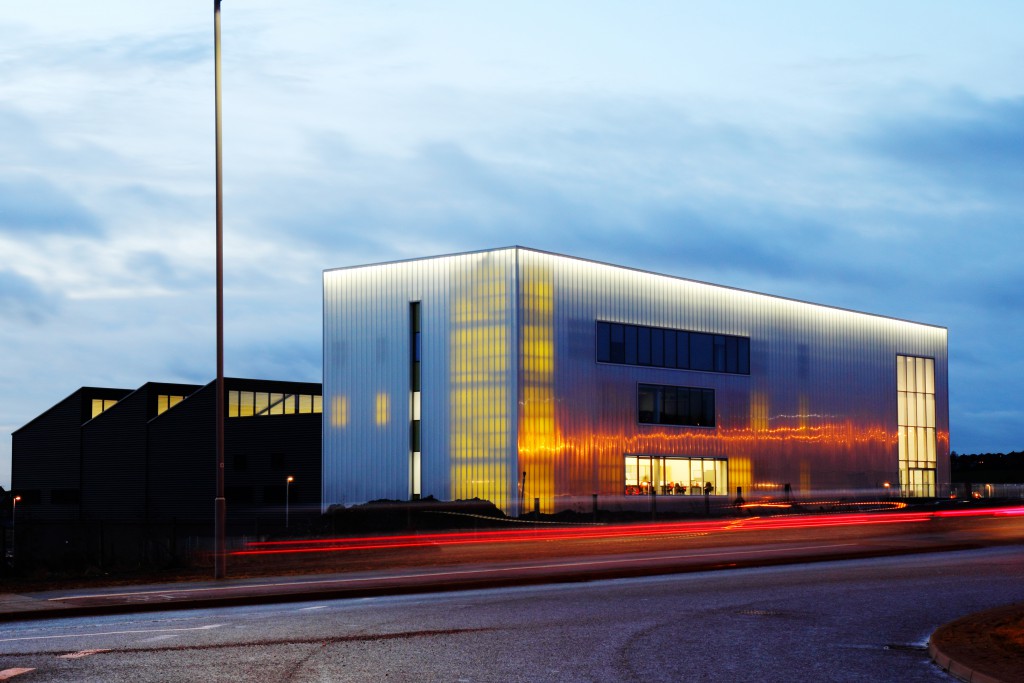 University of Sheffield – AMRC Training Centre
University of Sheffield – AMRC Training Centre
The AMRC Training Centre based at the Advanced Manufacturing Research Centre (AMRC) at the University of Sheffield provides advanced apprenticeship and degree-level training for companies in the advanced manufacturing sectors. The Centre opened in Autumn 2013 and has a strong focus on encouraging more young people to follow careers in engineering.
Origins and rationale
First established in 2001, the AMRC with Boeing was part-funded from Yorkshire Forward (the Yorkshire and the Humber RDA) and the European Regional Development Fund (ERDF). In 2004 it moved to a new facility as anchor tenant for the Advanced Manufacturing Park within the Sheffield and Rotherham Enterprise Zone. In 2008 it received £10m to build the AMRC Rolls-Royce Factory of the Future, which was expanded in 2012. The partnership now has over 80 industrial members, from global employers through to local specialist SMEs who pay an annual fee to access the AMRC’s resources and expertise.
The AMRC with Boeing sits alongside AMRC Castings (Formerly Castings Technology International or Cti), the National Metals Technology Centre (Namtec), the AMRC Training Centre and the AMRC Knowledge Transfer Centre.
They form the University of Sheffield AMRC group, along with the Nuclear AMRC, which applies the same collaborative research model to the civil nuclear manufacturing supply chain. Both AMRCs form part of the Government’s funded High Value Manufacturing Catapult.
How does it operate in practice?
In 2014-15 the Centre trained 410 first and second year apprentices, aged 16 and over, and at full capacity it will train 750 apprentices per year. Apprentices split their time between the AMRC Training Centre and employers in the Sheffield city region, including Tata Steel, Rolls-Royce, Sheffield Forgemasters, AESSEAL, MTL Group and Newburgh Engineering and the AMRC Group.
From 2015, a programme (supported by the Merchant bankers Close Brothers and the Manufacturing Technologies Association (MTA)) will co-fund the wages of 20 apprentices a year employed at SMEs who will then be trained by the AMRC Training Centre.
The AMRC also offers CPD programmes, including an apprentice mentoring program to help companies that are new to taking on apprentices or who wish to refresh their mentoring skills. It also hosts outreach activities with schools to provide pupils and teachers with an insight into engineering careers.
What works well and why?
The AMRC Training Centre developed its training courses so that they are adaptable to the complex and rapidly-changing needs of the advanced manufacturing sector.
Apprentices value the opportunity to combine work and high-level technical education, funded by their employer, without having to go direct from school to university. This significantly reduces the financial burden of their studies and also gives them valuable work experience, combined with access to AMRC’s leading-edge research.
The Centre has also developed a collaborative environment for trainees where they have access to state-of-the-art educational facilities and training workshops that are equipped with production-class manufacturing equipment.
The Centre has widened access to high-level training. It is a unique model combining work-based further and higher education in an internationally-leading research centre, embedded in an advanced manufacturing workplace environment. In 2014, it won the Times Higher Education Outreach Award for its approach to bridging the manufacturing skills gap whilst promoting social mobility.
Employers value this form of collaboration as it combines innovation and knowledge transfer with education and training for employees and potential future recruits. Graduates go on to regenerate the pool of highly-skilled workers in the advanced manufacturing sectors.
What were/are the key challenges and how were they addressed?
The AMRC Training Centre faced a number of challenges ahead of its launch, most notably securing funding, developing courses from scratch and recruiting relevant staff who had recent industrial and training experience.
It puts significant efforts into creating a network of local businesses which played a major role in helping to identify the course content that would develop the advanced manufacturing skills companies needed. As a result, they have become a strong advocate of the Training Centre ethos which combines filling a developing skills gap while improving access to higher education.
Future plans and developments
The AMRC has plans for an introductory programme that will help young people aged 16 to 25 who aren’t in education, training or employment and may need to overcome a number of disadvantages to secure employment.
The AMRC also aims to expand its operations on a new Advanced Manufacturing Campus, which could result in the University building up to a million square feet of new research facilities on Sheffield Business Park (close to the Advanced Manufacturing Park). It will cover several new areas including process control engineering, polymers, and automation and robotics for food manufacturing. The AMRC group also wants to exploit opportunities presented by the High Speed Two (HS2) rail link and the Chancellor’s ambitions to develop a ‘Northern Powerhouse’.
The AMRC is working with the High Value Manufacturing Catapult and the EEF, the Manufacturing Organisation, to develop a new National College for Advanced Manufacturing involving the AMRC and MTC Lloyds Advanced Manufacturing Training Centre in Coventry. This will be established as a network of hubs that will identify and work with the best established providers nationwide.
Read the full report here.




